Politics
What a Harris Presidency Could Mean for Small-Business Owners
Published
8 months agoon
By
Ekwutos Blog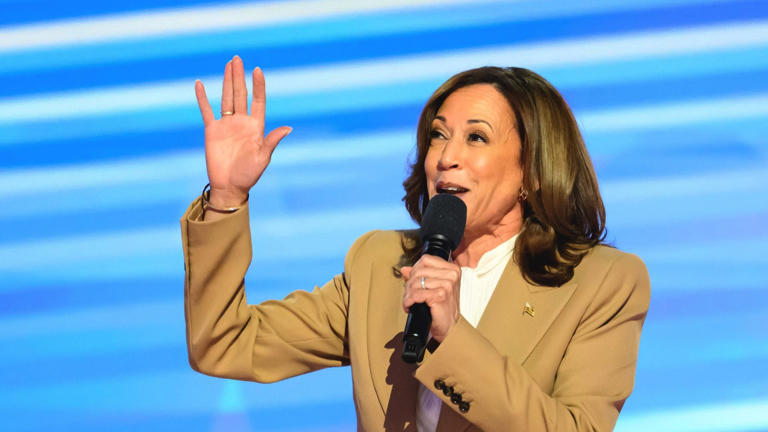
Vice President and Democratic presidential nominee Kamala Harris recently unveiled her economic plan. While there are few specific details regarding small-business owners, her past stance on the issue might provide a glimpse into what she intends to do to help them if she wins.
Read Next: How Much Is Vice President Kamala Harris Worth?
Trending Now: 7 Reasons You Must Speak to a Financial Advisor To Boost Your Savings in 2024
On August 14, Harris said in a statement that small businesses are “the backbone of our communities.”
“They strengthen the middle class by creating jobs, advancing opportunity, and establishing pathways for Americans to build intergenerational wealth,” she said in the statement posted on the White House website.
In turn, she also announced that day that a record 19 million new small business applications had been filed under the Biden-Harris administration.
Earning passive income doesn’t need to be difficult. You can start this week.
She Will Continue to Support Minority-Owned Small Businesses
Under the current administration, the Small Business Administration (SBA) “has backed $35 billion in loans to over 68,000 minority-owned small businesses, an increase of more than 13% compared to the entirety of the prior administration,” according to a White House Fact sheet.
In turn, Rohit Arora, CEO of Biz2Credit, said that Harris has focused on expanding access to capital to people who have traditionally been excluded from economic prosperity — something she might continue doing if she wins.
“The agency has tripled SBA lending to Black-owned businesses and doubled small-dollar lending and lending to Latino and women-owned small businesses,” said Arora. “There is no reason to believe that policy would veer away from this path in a Harris-Walz administration if they win in November.”
Find Out: Trump Wants To Eliminate Income Taxes: Here’s What That Would Mean for the Economy and Your Wallet
Continue Funding for Underbanked Small Businesses
During her time in the Senate and as part of the current administration, Vice President Harris led efforts to invest billions in community development financial institutions (CDFIs), which are mission-driven lenders that specialize in delivering capital to underbanked small businesses, explained Carolina Martinez, CEO of CAMEO Network, California’s statewide micro-business network.
“Those of us in the small business advocacy community expect she will continue this commitment, and we are excited to see how these investments support and sustain the current small business boom,” she added.
While Well-Intentioned, Her Policies Might Hurt Small Businesses
Dave Hebert, economist at the American Institute for Economic Research, argued that while Harris’ previous policy proposals “sound lovely,” unfortunately they would be difficult for small businesses to absorb.
For example, she has advocated for increasing the mandated amount of paid family and medical leave from six weeks to six months.
“While this sounds great, both for mothers and fathers who typically must return to work shortly after the birth of a child, it would be an economic nightmare,” he said. “Someone has to pay for the paid leave and increasing the cost of labor for a small business that is already struggling to stay in the black would force many to close.”
In that same vein, Harris has supported raising the federal minimum wage to $15 an hour.
And according to Arora, this policy would disproportionately hurt businesses that are struggling to pay higher wages during inflationary times.
Finally, Arora added that Harris supports stronger environmental and labor regulations, which hinder small businesses and increase their cost structures.
Widening the “Huge Disconnect”
Meanwhile, other experts are less enthusiastic about what a Harris win could mean for small businesses. For instance, Joe Camberato, CEO of National Business Capital, said that he’s not optimistic about the future for small businesses if Harris wins.
“Right now, small businesses aren’t in growth mode because the economy itself isn’t growing,” he said, adding that small business owners are hesitant to make decisions because they’re worried about what’s coming next.
According to him, there’s “a huge disconnect” between what’s happening on Wall Street and what’s really going on Main Street.
“Small businesses are just getting by, and it wouldn’t take much — a small setback could be enough — to push them out of business,” he said. “We’ve already seen bankruptcy filings double in the last two years, but that’s not getting the attention it deserves.”
Editor’s note on election coverage: GOBankingRates is nonpartisan and strives to cover all aspects of the economy objectively and present balanced reports on politically focused finance stories. For more coverage on this topic, please check out Millennial Entrepreneurs: 4 Financial Policies We Want Under a Trump Administration.
You may like
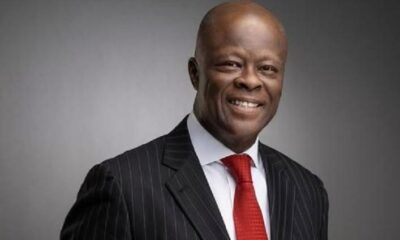

US tariffs won’t have much effect on Nigeria – FG


Wike hosts suspended Rivers lawmakers in UK
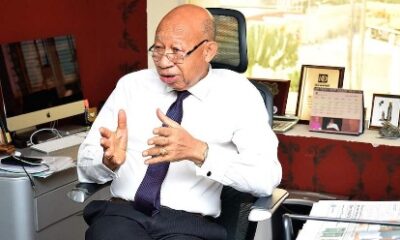

Pascal Dozie, Founder Of Diamond Bank Passes Away At 85
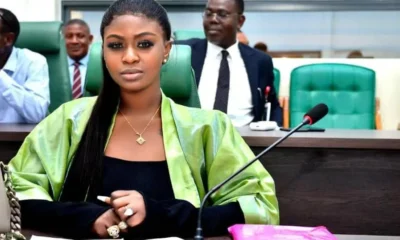

Tuface’s lover Natasha Osawaru replaced as Deputy Leader after shake-up in Edo Assembly


Nigeria seeks to host 2030 Commonwealth Games


Garnacho has to leave Old Trafford, make way for Osimhen – Rio Ferdinand
Politics
Wike hosts suspended Rivers lawmakers in UK
Published
6 hours agoon
April 8, 2025By
Ekwutos Blog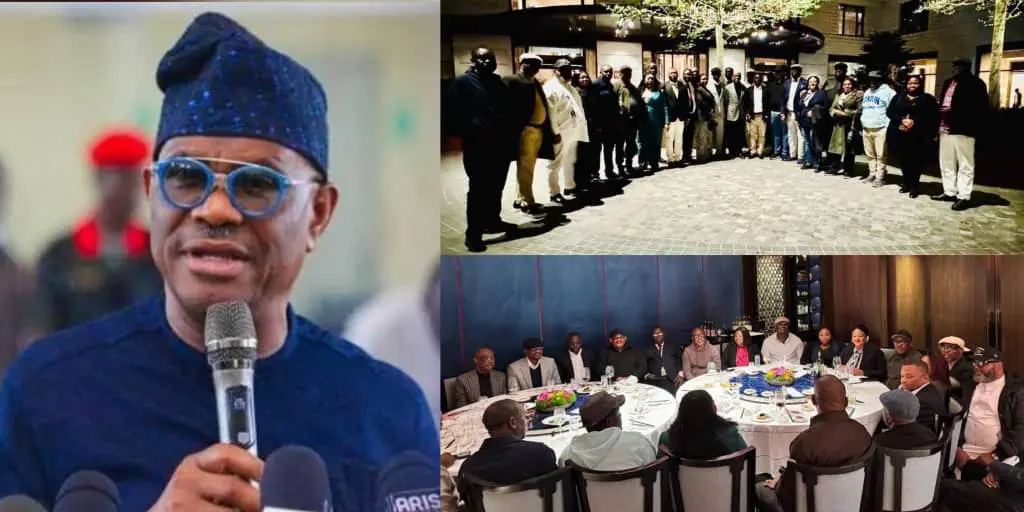
The Minister of the Federal Capital Territory, FCT, Nyesom Wike, on Monday met with the suspended members of the Rivers State House of Assembly.
Wike hosted the suspended lawmakers for a dinner in the United Kingdom, UK.
This followed his earlier meeting with some of his political allies in Port Harcourt, the Rivers State capital, on Sunday.
The meeting was disclosed by the minister’s media aide, Lere Olayinka, via his Facebook page.
According to Olayinka: “Yesterday, the FCT Minister, Nyesom Wike, hosted Rivers State House of Assembly members who are in the United Kingdom for Legislative Capacity Building, to a dinner. Wike left Nigeria on Sunday night after visiting his political friends and associates in Port Harcourt, Rivers State.”
Recall that the lawmakers were suspended by President Bola Tinubu after declaring a state of emergency in Rivers State due to security concerns. Governor Sim Fubara was also suspended for six months. The emergency rule stemmed from the ongoing political crisis between Wike and Fubara.
The crisis had affected the lawmakers and the entire political structure in Rivers State.
The Supreme Court later intervened, ordering the reinstatement of the lawmakers and directing Governor Fubara to present the 2024 budget before the Martins Amaewhule-led Assembly.
However, Fubara’s attempt to present the budget was thwarted as the lawmakers barred him from accessing the Assembly complex.
The suspended lawmakers are currently in the UK for a legislative capacity-building programme.
Politics
Tuface’s lover Natasha Osawaru replaced as Deputy Leader after shake-up in Edo Assembly
Published
14 hours agoon
April 8, 2025By
Ekwutos Blog
Blessing Agbebaku and Maria Edeko on Monday retained their positions as the Speaker and the Deputy Speaker of the Edo State of Assembly after a minor leadership shuffle.
Ekwutosblog reports that the duo who are members of the Peoples Democratic Party, PDP, retained their positions following the implementation of a letter sent to the House by the state leadership of the All Progressives Congress, APC.
Agbebaku who read the letter addressed to him by the acting state chairman of APC, Jarret Tenebe, however, announced a minor change in the principal officers of the House.
Charity Aiguobarueghian, PDP, Ovia North-East I, Natasha Osawaru Irobosa, PDP, Egor, and Yekini Idaiye, PDP, Akoko-Edo I, were removed as the Majority Leader, Deputy Leader and Chief Whip of the House, respectively.
Natasha Osawuru is the lover of singer Tuface.
The trio were replaced with Ibhamawu Jonathan Aigbokhan, APC, Esan West as Majority Leader, Addeh Emakhu Isibor, APC, Esan North-East I, and Lecky Hussein Mustapha, APC, Etsako West I as Deputy Leader and Chief Whip of the House, respectively.
The position of the Deputy Chief Whip earlier given to Richard Edosa, Oredo West constituency, was eventually cancelled as there was no such position in the legislature.
The letter dated April 7, 2025, titled ‘Nomination of Principal Officers of the Edo State House of Assembly’, was signed by Tenebe, state acting chairman of APC and Lawrence Okah, the secretary.
Parts of the letter read: “We write to refer you to our earlier correspondence dated 14th March, 2025 to your office notifying you of the majority status of our party, the All Progressives Congress, APC, in the Edo State House of Assembly.
“Consequently, we hereby forward to you the party’s nomination of principal officers’ position in the House.
“Majority Leader, Hon Ibhamawu Jonathan Aigbokhan, Esan West constituency, Deputy Majority Leader, Hon Emakhu Addeh Isibor, Esan North-East I, and Chief Whip, Hon Lecky Hussein Mustapha, Etsako West constituency.”
The majority leader and deputy majority leader are from Edo Central Senatorial District while the Chief Whip, Lecky Hussein Mustapha, is from Edo North Senatorial District.
Recall that Richard Edosa was the only lawmaker elected on the platform of the Labour Party but he recently defected to the APC.
The Speaker, Agbebaku disclosed that the PDP would also bring its list of nominees of principal officers to the House.
He noted that his position as the Speaker and that of the Deputy Speaker were not guaranteed in the ongoing leadership change in the House.
Politics
NEC Meeting: No vacancy in LP leadership – Abure warns Peter Obi, Otti
Published
23 hours agoon
April 7, 2025By
Ekwutos Blog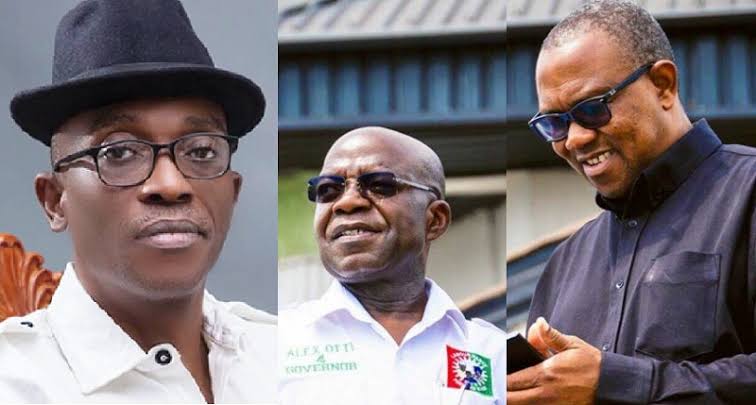
The National Chairman of the Labour Party, Julius Abure on Monday warned there is no vacuum in the party’s leadership.
Abure issued the warning ahead of the party’s National Executive Committee, NEC, meeting called by LP’s former presidential candidate, Peter Obi and Governor Alex Otti of Abia State.
Speaking at a public conference at the party secretariat, Abure described Obi and Otti as betrayals.
He noted that the Supreme Court was clear in its judgment, stressing that LP matters are internal affairs of political platforms.
According to Abure: “Tell them that there is no vacancy in our party. In the Labour Party, we don’t betray our candidates even though some betray us after giving them tickets.
“We also want to urge those who have been deceived by last week’s misleading interpretation of the Supreme Court judgment to disregard the speculation. I remain the National Chairman of the Labour Party.
“Again, the Labour Party Constitution does not recognise the setting up of a caretaker committee for party affairs.”
Ekwutosblog had reported that Obi and Otti had called for a NEC meeting scheduled to hold on Wednesday in Abuja.
The duo said the meeting would be followed by a town hall engagement with major stakeholders at the Transcorp Hilton in Abuja.

US tariffs won’t have much effect on Nigeria – FG

Wike hosts suspended Rivers lawmakers in UK

Pascal Dozie, Founder Of Diamond Bank Passes Away At 85
Trending

 Trending6 months ago
Trending6 months agoNYA demands release of ‘abducted’ Imo chairman, preaches good governance
- Business6 months ago
US court acquits Air Peace boss, slams Mayfield $4000 fine

 Politics6 months ago
Politics6 months agoMexico’s new president causes concern just weeks before the US elections
- Entertainment6 months ago
Bobrisky transferred from Immigration to FCID, spends night behind bars
- Entertainment6 months ago
Bobrisky falls ill in police custody, rushed to hospital

 Politics6 months ago
Politics6 months agoRussia bans imports of agro-products from Kazakhstan after refusal to join BRICS

 Politics6 months ago
Politics6 months agoPutin invites 20 world leaders
- Politics1 year ago
Nigerian Senate passes Bill seeking the establishment of the South East Development Commission.

